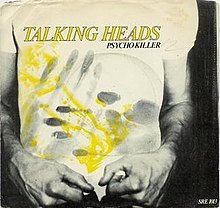Psycho Killer
| "Psycho Killer" | ||||
|---|---|---|---|---|

U.S. vinyl edition cover
|
||||
| Single by Talking Heads | ||||
| from the album Talking Heads: 77 | ||||
| B-side | "Psycho Killer" (Acoustic version) "I Wish You Wouldn't Say That" |
|||
| Released | December 1977 | |||
| Format | 7" | |||
| Recorded | 1977 | |||
| Genre | ||||
| Length | 4:19 | |||
| Label | Sire | |||
| Writer(s) | ||||
| Producer(s) |
|
|||
| Talking Heads singles chronology | ||||
|
||||
"Psycho Killer" is a song written by David Byrne, Chris Frantz and Tina Weymouth and first played by their band the Artistic in 1974, and as Talking Heads in 1975, with a later version recorded for their 1977 album Talking Heads: 77. In the liner notes for Once in a Lifetime: The Best of Talking Heads (1992), Jerry Harrison wrote of the b-side of the single, an acoustic version of the song that featured Arthur Russell on cello, "I'm glad we persuaded Tony [Bongiovi] and Lance [Quinn] that the version with the cellos shouldn't be the only one."
The band's "signature debut hit" features lyrics which seem to represent the thoughts of a serial killer. Originally written and performed as a ballad, "Psycho Killer" became what AllMusic calls a "deceptively funky new wave/no wave song" with "an insistent rhythm, and one of the most memorable, driving basslines in rock & roll."
"Psycho Killer" was the only song from the album to appear on the Billboard Hot 100 chart, peaking at number 92. It reached number 32 on the Triple J Hottest 100 in 1989, and peaked at number 11 on the Dutch singles chart in 1977. The song is included in The Rock and Roll Hall of Fame's 500 Songs that Shaped Rock and Roll.
The song was composed near the beginning of the band's career and prototype versions were performed onstage as early as December 1975. When it was finally completed and released as a single in December 1977, "Psycho Killer" became instantly associated in popular culture with the contemporaneous Son of Sam serial killings. Although the band always insisted that the song had no inspiration from the notorious events, the single's release date was "eerily timely" and marked by a "macabre synchronicity".
...
Wikipedia
